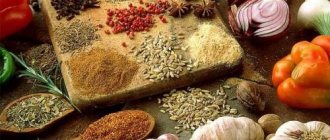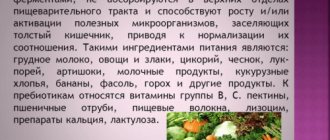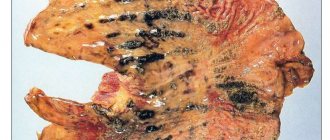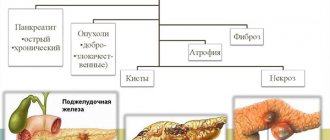In the first months of life, the baby's digestive tract undergoes a number of changes, which can cause colic. Mothers are worried about their children and ask how to help their child with colic.
so that everything is in order with the tummy. We will discuss the problem of infant colic in detail with the pediatrician of the Mother and Child clinic on Savelovskaya, Candidate of Medical Sciences Alla Anatolyevna Shcherbakova.
— Alla Anatolyevna, mothers are often worried about the issue of infant colic. What is colic in a child and how does it manifest itself?
— Colic is a behavioral disorder in a child associated with abdominal pain caused by gas formation in the large intestine during feeding. When a baby is born, his microbiotic status changes
: opportunistic microorganisms in the child’s intestines produce gases, and these gases, passing through the intestines, cause discomfort.
Typically, colic manifests itself like this: the mother begins to feed the baby, the baby eats, worries, throws the breast or bottle, cries, twists his legs or presses them to his stomach.
— Is colic normal?
— Intestinal colic is considered normal
and relate to the body’s protective reaction - “physiological inflammation”, which is formed in response to the transition from intrauterine to other nutrition (mother’s milk or formula).
— When does colic begin in newborn babies, how long does it last and when does it end?
- There are also babies who do not experience colic at all. But most often the onset of colic occurs at two to six weeks of age. Colic usually lasts up to three months
, however, there are children who experience colic before six months. Although this is more the exception than the rule.
— How to understand that a child has colic, and how to distinguish intestinal colic from other causes of baby anxiety and crying?
— The answer to this question can take an entire pediatric appointment. Colic most often occurs in the evening
and are associated with feeding: that is, the baby began to eat and began to cry. Usually the attack lasts about three hours, the tummy may be round and swollen. If the baby is gaining weight and everything is fine with his general condition, then with some degree of probability we can say that everything is fine with him.
But it also happens that a child cries, for example, due to increased intracranial pressure or some problem with the digestive organs. Therefore, only a doctor during an appointment can reliably determine the cause of a baby’s restless behavior.
During the training process, doctors are allowed to listen to a recording of infant cries during colic, so that each specialist can feel the unpleasantness of such a moment.
— When is colic more common - when breastfed or bottle-fed?
— It is difficult to unambiguously establish a direct connection between the frequency of colic and the type of feeding. Considering that mother's milk is unsterile, and the composition of modern milk formulas promotes digestion, we can say that the likelihood of colic occurring is approximately the same.
Causes of colic in a newborn
— If colic occurs equally often on breastfeeding and bottle feeding, then what are the reasons for its occurrence?
— There may be several reasons, the main ones include:
- Transient lactase deficiency.
- During breastfeeding and mixed feeding, the cause of colic may be improper attachment of the baby to the breast.
- Incorrect bottle feeding can cause colic.
- Improper nutrition of a nursing mother can also cause colic.
- Incorrectly selected milk formula.
- The psychological and physical climate plays a big role in the nutrition of infants.
The carbohydrate lactose is an essential component of breast milk or infant formula, which is involved in the formation of the brain. To better break it down, an enzyme called lactase is needed. The first months of life are an important period of maturation of the child’s body, and at this time the baby’s pancreas produces an insufficient amount of lactase
(or its low activity is noted). In turn, its deficiency leads to difficulties with the breakdown of lactose.
Thus, transient lactase deficiency occurs (that is, temporary, passing deficiency of the enzyme), causing colic. There are different opinions about lactose-free formulas, but you should not exclude lactose from your baby’s diet.
, since this is not a panacea for colic, but lactase deficiency is a temporary and fleeting phenomenon.
It often happens that mothers at an appointment ask to show how to properly put a baby to the breast and how to feed him. We explain that the mother needs to be in a relaxed state, take a comfortable position and make sure that the baby grasps the nipple with the areola and does not swallow air. Babies who suck voraciously are at a particularly high risk of colic: they may swallow air.
which enters the intestines. There it “turns” into gas bubbles, causing colic.
All modern bottles are equipped with a valve that releases excess air. There are also “anti-colic” bottles with anatomically shaped nipples that follow the contours of a woman’s nipple. A comfortable and physiological grip on the nipple minimizes the likelihood of the baby systematically swallowing air during feeding.
Many researchers associate the occurrence of colic in infants with food allergies.
.
Nowadays, many children are born with a predisposition to food allergies. We tell moms that the most common cause of food allergies in young children is cow's milk protein intolerance
. That is, for a mother who is breastfeeding and who has a family history of food allergies, it is better to limit or completely eliminate products containing cow’s milk protein from her diet, since this causes food allergies in the child, and colic in such a case is a manifestation of food allergies. allergies.
If we talk about non-dairy products in a mother’s diet, then we can note the widespread opinion about legumes. In fact, legumes can affect the mother's bloating, but if she tolerates such foods well, then she can eat pea soup and other dishes - this will not affect the baby's colic.
Feeding a bottle-fed baby helps control colic. For example, cow's milk protein intolerance may be accompanied by colic.
. In this case, the cow's milk formula will most likely need to be changed.
The main thing is to provide the baby with a favorable environment during feeding, with direct contact between the nursing woman and the child. It is important that the mother looks at the baby, and he looks at the mother, and that nothing distracts them. When parents ask whether a cat, loud noises or bright lights can cause colic, the answer is of course not. However, external bright stimuli can provoke colic.
: create a nervous environment around the baby and lead to aerophagia.
Aerophagia is the swallowing of large amounts of air during feeding.
How to help baby with colic
— Please tell us about nutritional correction if the baby is breastfed.
— We talked about cow’s milk intolerance earlier. In general, the nutrition of a nursing mother should be varied, complete and sufficient. Mom does not need to eat for two, because she will quickly gain excess weight and have difficulty returning to normal after breastfeeding. At the same time, mother should not starve. Vegetables, fruits, berries, olive oil, meat, fish - the diet of a nursing mother should meet her daily needs. If an older child has a food allergy, you need to be careful about your diet when feeding your younger one: try a little food and observe the baby’s reaction.
— What to do with colic with food if the baby is mixed or bottle-fed?
— When selecting infant formula, the doctor is guided by an examination and the condition of the child. The most important indicator of any formula is compliance with the composition of mother’s milk
. Manufacturers add prebiotics and probiotics, iron, calcium, lutein and other ingredients to infant formula to make it as close as possible to the composition of breast milk.
Artificial feeding is when the baby eats only formula. Mixed feeding or supplementary feeding - when the mother does not have enough milk and partial nutrition is used (the baby is supplemented with infant formula).
— Is it possible to give goat milk formula for colic?
— It is impossible to determine in advance how a child will tolerate this or that milk. Approximately 9% of children do not digest cow's milk
, but they tolerate goat well.
With the help of the mixture, manufacturers try to make the child’s digestion as easy as possible. But for the mixture to become an effective assistant, it must be selected with a doctor. A mixture for comfortable digestion
goat 's milk, which has a beneficial effect on the formation of soft stools, for example, MAMAKO® Premium*, can cope with colic.
These are mixtures for feeding healthy children, which provide comfortable digestion and prevention of functional disorders of the gastrointestinal tract, including colic. MAMAKO® 1 Premium with 2'-FL oligosaccharides from breast milk is an important step in the evolution of infant nutrition.
— Are there medicinal methods to combat colic?
— Sometimes mothers ask what pill to take so that the baby does not have colic, but such drugs do not exist yet
.
Currently, drug therapy includes prescribing drugs to children that make colic less pronounced - in fact, large bubbles of gas in the intestines turn into small ones, due to which bloating and pain in the baby’s tummy disappear. Preparations with probiotics
- they can reduce the severity and frequency of infant colic.
— Is it possible to use traditional methods for colic?
— Some traditional methods are effective, but doctors do not recommend using others.
- Due to the immaturity of the digestive system, babies are prone to constipation. Using a gas tube
, the mother causes defecation and the release of gases, and thereby improves the child’s condition. - A warm diaper on the tummy
is suitable for colic as a distracting method with an antispasmodic effect. The baby feels warmth and affection, they take him in his arms, stroke his tummy - as a result, the spasm and colic go away. - Contact with mom is important. If the baby has eaten, he is in a dry diaper, the mother takes him in her arms, walks around the room with him, cuddles him - all this will help with colic. There is the so-called mother's gymnastics
- an excellent remedy for colic, which is a daily ritual of every caring mother: she undresses, dresses, bathes the baby, strokes his tummy, legs, arms and back, and does a light acupressure around the navel. Pleasant touches help calm the baby and eliminate colic. - Russian mothers are very fond of giving dill water
, because this is what their mothers and grandmothers did. But dill water differs from breast milk in its physicochemical properties and osmolarity - and, thus, acts as an irritant, so in itself it can provoke colic.
Drug treatments
Linex is a drug for restoring intestinal microflora.
The pediatrician must be informed about infant colic.
He will examine the child, conduct the necessary examinations, and prescribe treatment. The most commonly prescribed treatment regimen looks something like this.
- Taking probiotics. These include Acipol, Linex, Probifor, Lactobacterin, Bifidumbacterin Forte, Bifiliz. These products help restore normal microflora.
- Carminatives. This is a group of simethicone (Bobotik, Smecta, Espumisan). They help eliminate excess gases naturally, which immediately relieves pain.
- Sedative. Phenibut, Anvifen, Pantogam. If the mother is breastfeeding, she will be prescribed soothing herbs, in particular valerian and motherwort.
- If dysbiosis is detected, Probifor, Acilac, Bobakton, Florin Forte are prescribed. If reflux leads to the reflux of hydrochloric acid into the esophagus, then antacids, for example, Maalox, will be required. Histamine neutralizers are also prescribed, in particular Ranitidine, Cimetidine, Nizatidine.
- In case of increased gas formation, Milikon and Gaviscon are given.
- Enzymes (Creon) may improve stomach function.
The wide range of drugs that are given for colic does not mean that this is the only panacea for ills. Many of them cannot help the child at all and alleviate his condition. Therefore, experts believe that the best treatment option is watchful waiting.
Prevention of colic in a newborn
— You told me how to help with colic. How to prevent their occurrence, what serves as prevention?
— There are several methods to prevent this problem.
- To reduce the likelihood of colic, apply your baby to the breast correctly
. After feeding, be sure to keep the baby in an upright position for some time, in a “column” position, stroking the back - then the air will not go further into the digestive system and will not lead to colic. - While breastfeeding, women often ask about coffee and carbonated drinks, legumes, seafood, grapes and sauerkraut - foods that can cause flatulence. If the mother tolerates such dishes well, then she can eat and drink them to satisfy her desire, but little by little. This will not affect the baby's colic in any way. But the emotional state is transmitted to the baby. A well-fed and satisfied mother means a happy baby without colic!
- If the baby is an artificial baby, then choose a bottle for him that has an “anti-colic effect
,” that is, it prevents him from swallowing air. - If your baby has colic, behave calmly
, calm and caress the baby. Distract him in any possible way, for example, talk to the baby, changing intonations, sing a lullaby, use a rattle or melodic bells, show spinning toys.
— Alla Anatolyevna, why are there no guarantees even if all recommendations are followed?
“If a mother has slept well, eaten well, walked with her child in the fresh air and armed herself with knowledge, then she calmly perceives the situation. For her, colic is a physiological and passing norm, which can be corrected by various available methods.
Medical recommendations can make colic easier and help reduce the occurrence of colic. And the best preventative complex is mother’s hands and affection. You just need to wait out this period!
Tummy pain and inconsolable crying of a baby can be caused by various problems, including gastrointestinal ones. Discuss your baby's restless condition with your doctor, as there are pathologies that may only appear to be colic. During colic attacks, the main task is to calm the baby as much as possible using available methods. But you should not give your child medications, herbal remedies or other sedatives without first consulting your pediatrician. Almost all children go through a period of infant colic, and, fortunately, they disappear with age as suddenly as they begin.
Candidate of Medical Sciences, pediatrician Alla Anatolyevna Shcherbakova
*The ideal food for an infant is mother's milk. WHO recommends exclusive breastfeeding for the first 6 months. MAMAKO® supports this recommendation. Before introducing new foods into your baby’s diet, consult a specialist.
About the daily routine
A child is also a person, and everything human is not alien to him. If he sleeps during the day, pleasing his parents, then what should he do at night? That's right, stay awake. Hence the question. Or maybe the parents have colic? Who created problems for themselves out of the blue with their own hands.
The child demands attention! The success of a sound sleep in an active day. How? Active: feeding, wakefulness, gymnastics, massage, communication, change of environment, etc. And your day's work will pay off with a restful night's sleep.
Reviews #MAMAKO
kanstansiya
Why do mothers choose adapted MAMAKO® Premium formulas? The story of how Savely overcame colic. Mothers whose babies are completely on IV are faced with some problems when choosing a formula. For Savely, choosing a mixture, as it turned out, was not an easy task. We tried many companies, but in the end we came to one - Adapted milk formula from @mamako.ru Premium with natural goat milk, its creamy taste conveys all the love of nature. We, like many, encountered bloating, gas and colic, and only a mixture with goat milk miraculously helped us forget about this terrible word - “colic”. As a mother, it is very important to me that the baby receives the most necessary vitamins for the development and growth of the child.
shitova_sasha
It so happened that I need to heal a little. Perhaps someday I will talk about this and urge everyone to take care of themselves, but that’s not what I’m talking about right now. Although our IV is temporary, I approached the issue of choosing a mixture thoroughly. Now we eat the @mamako.ru mixture, which is produced on the basis of goat milk in Spain. Why did I choose a mixture with goat milk? Firstly, it has a different composition of proteins than cow milk. Therefore, if a child is intolerant to cow's milk, then a goat's milk formula may be suitable for him (exactly our case). BUT! If you have allergies, you should always consult your pediatrician! Secondly, precisely due to the properties of goat’s milk, soft, curdled flakes are formed in the baby’s stomach, which are easier to digest.
About the role of microbiota
A great variety of representatives of the world of viruses and bacteria live on the human skin and mucous membranes. And this diversity is extremely important. Together they are a kind of “border guards” who protect the internal environment of the body. Moreover, the intestines are a training ground for the immune system. And the more types of microbes are present in it, the more adapted (trained) the owner is.
If the intestines’ own inhabitants cannot cope with the tasks, or their numbers are extremely small, microbes unfriendly to humans begin to predominate, causing harm and disrupting the functions of the skin and mucous membranes. This leads to increased permeability, deterioration of barrier functions and the development of a number of adverse consequences.
In such cases, trusted friends – probiotics – can come to the rescue.
Treatment with folk remedies
The most common folk method for relieving pain in infants with colic is taking medicinal herbal infusions.
This method was used many centuries ago, when loud children’s crying was constantly heard in a house where there was a newborn baby. Using any of the decoctions described below, everyone should understand that they are all imperfect and have their own side effects.
In past centuries there were no other ways to help children, and today turning to traditional medicine is not always justified.
Fennel drink
Fennel tea will help get rid of increased gas formation in your baby.
Fennel seeds are brewed with boiling water (one glass per spoon). The composition is infused for 60 minutes.
Then the product is filtered and given to the child one spoon at a time. The drink must be given warm.
Dill water
The proportions and process are the same as for the fennel potion. For a spoonful of seeds - a glass of boiling water.
You need to infuse the composition for an hour and a half. To simplify the process, sachets purchased at the pharmacy are dipped into boiling water.
Anise drink
Anise seeds are boiled in water. For a glass - half a spoon. The seeds should boil for 10 minutes. Then the product is cooled, filtered, and the resulting anise water is placed in the refrigerator. The child should be given food in small doses: add 3 drops to the water.
Expert opinion
Professor E. S. Keshishyan says that “to one degree or another, intestinal dysfunctions occur in almost all young children and are a functional, to some extent conditional physiological state during the period of adaptation and maturation of the gastrointestinal tract of an infant. Intestinal colic is caused by the morphofunctional immaturity of the neuromuscular apparatus of the child’s intestines against the background of the immaturity of the enzyme system and the formation of intestinal microbiocenosis”**. Nevertheless, colic still remains the most poorly understood condition among the symptoms of digestive discomfort, so a variety of types of mixtures are used to treat its manifestations. In the treatment of symptoms of minimal digestive dysfunctions, such as colic, constipation, regurgitation, everything is important: whether the child was born full-term or not, naturally or by cesarean section (children born through cesarean section are characterized by a longer formation of intestinal microflora), whether it was breastfed or on artificial, mixed feeding and much more.
It is important!
It is often enough to reassure the parents and wait until the baby outgrows this condition without changing the diet.
It must be remembered that a change in diet is a serious stress for a newborn. Which mixture is suitable for a baby with colic can only be determined by the doctor observing the child. It is very important whether the colic is isolated as a painful spastic syndrome or is it combined with other digestive disorders (colic, regurgitation, constipation). The choice of mixture depends on this.











